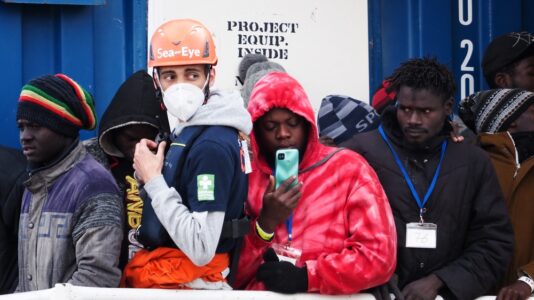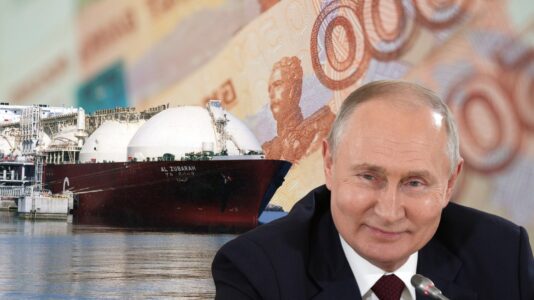Even the most ardent critics of the vulgar and decadent spectacle that the French have woven into the opening ceremony of the Olympic Games underestimate the magnitude of the catastrophe it represents. For in addition to blasphemy, an insult to good taste and ideological madness, the matter has yet another dimension — a geopolitical one. Unfortunately, it will have long-term consequences.
To put it briefly, in the war that the presidents of China and Russia have declared against the West, they have just received from France a weapon more powerful than hypersonic missiles.
I think it’s a waste of time to prove how powerful images are today — an expressive, emotional frame, sometimes sharpened to “meme” form with a brief slogan. One needs only to recall how effectively the European public’s resistance to opening up to mass immigration was crushed by the circulation of a photo of a dead child on a Turkish beach, with the suggestion that he was a victim of rich countries’ insensitivity to the “refugee drama.” The images that France has sent out into the world have comparable power.
The opening ceremony of the Olympic Games, broadcast around the world, was watched live by hundreds of millions of people on every continent — and billions more will be endlessly reminded of its most potent passages. What’s more, the most appalling scenes, parodying the “Last Supper” in a perverse-decadent convention, were inserted by the organizers out of the blue between the presentation of successive sports teams and artistic performances, in such a way that local broadcasters would not be able to skip or censor them. This manifesto of cultural decline was to be pressed into the eyes and minds of the entire world — and indeed, it was.
To what effect? You don’t have to be a great expert on other cultures to understand the extreme opposite of awe — excitement and the desire to imitate — which is probably what the authors of this pathetic spectacle, steeped in “woke” ideology, were hoping for. In fact, two sentiments — disgust and indignation — must have prevailed everywhere, whether among people shaped by Confucianism, Buddhism or Hinduism, Islam or Hispanic culture. By the way, we don’t have to guess about this because there were enough voices in the world in the first few days, including from governments and heads of state, to make this clear.
Strangely enough, European Christians may have felt indignation and disgust less so than other religions and cultures — we are already used to being second-class citizens, whom the ruling class constantly and demonstratively spits on and provokes by besmirching our sanctities. However, the images from the queer brothel, as they proudly call themselves “queer,” must have aroused disgust and opposition in every Muslim as well. Jesus, after all, is considered a “venerable prophet” in Islam, one of the heralds of Muhammad’s coming.
A bearded, fat peasant with women’s breasts sewn on, men cross-dressing in women’s underwear or latex, women pretending to be men, all wiggling their booties almost in front of the face of a 10- to 12-year-old girl is a blatant insult to notions of masculinity and femininity, whether expressed in the philosophy of seeking a balance between “yin” and “yang” or machismo. The earlier “red herring” in the message, showing two men and a woman locked in a garrotte as a symbol of love (with both men kissing passionately in front of their female companion’s face), must also have aroused at least distaste in the millions of viewers who were promised a sporting spectacle.
The “this is the West today” imagery broadcast from Paris showed the weakness and ridiculousness of the once-dominant civilization. According to popular belief, those who were once strong, who dominated the rest of the world, who robbed the rest of the world, and built their prosperity on colonial plunder, have completely degenerated in this prosperity, have become stupid, have not only lost their former strength and principles but even the elementary sense of common sense and decency. You see? They are just a bunch of degenerate queers. And it begs for everyone else to go to the West, hunt them down and take back the “stolen wealth.”
This fantastic propaganda gift is being given to the enemies of the West as they wage a hybrid war against it. Some do not want to acknowledge this war, preferring to speak cautiously of an “escalating confrontation” or “tension” between the “developed countries” and the “global south.” Never mind the name. Ever since the leaders of Russia and China issued a joint manifesto (incidentally, also during the Olympic Games, only the winter ones) openly calling on all non-Western countries to stand together with them against the Western civilization imposing its domination on the world and exploiting numerous peoples, these two countries have not stopped working to build a political bloc that pursues this goal.
This is the culmination of a process already well described in several books, including Joshua Kurlantzick’s “Liberal Democracy in Retreat,” which is available in Polish. By the 1970s, Western civilization was impressing the entire world, all the more so as Soviet socialism became a less attractive alternative to it. Every country, whether Asian or African, knew that the only way to modernize and prosper was to imitate Western models: one had to build a free market and democratize, adopt Western culture, educate the younger generations in the West or according to Western models, and to integrate into Western institutions. Then, the trend began to reverse, and it was not immediately understood that, for example, the defeat of the Westernization project in Iran was not a temporary retreat from the only possible path but the beginning of a new trend.
The confrontational manifesto of Xi Jinping and Vladimir Putin, followed a month later by a military challenge to the West in Ukraine, was an emphatic dotting of the i’s. Not only are we not inferior to the West and do not need to imitate its political and economic system, but we are better; we can and should reverse the global “pecking order,” change the hierarchy of power, and dethrone the White man. It is the same White man who, God only knows to what extent by himself and to what extent with the support of agents of influence, has at the same time begun to confirm in various ways that he feels himself to be a declining being, to deny his former values, to constantly apologize and bow before the people of color — recall, for example, the famous kneeling, enforced by the “Black Lives Matter” movement).
Nevertheless, the dream of uniting China and Russia into a large, cohesive, anti-Western bloc is far from being realized. Projects for a common BRICS currency to compete with the dollar have come to nothing — their economic interests are too divergent. Moreover, for cultural and historical reasons, recognition of China’s leadership remains unacceptable to many Asian countries, led by a rising India. Nevertheless, there is a glue that binds the societies of the postulated coalition countries together: it is precisely the growing contempt for the West and the inherent hostility to it, the desire to avenge all the real and imaginary wrongs once suffered at the hands of the colonizers, and today at the hands of the global corporations, overwhelmingly operating from the U.S. and Europe, which are perceived as ruthless in their greed.
This allows China and its followers to hold out hope that world domination will pass into their hands sooner or later — all they have to do is patiently, step by step, fight the West with all available means. Whatever we want to call it: this is war. And in war, the narrative that explains and justifies its conduct is a weapon at least as important as direct means of destruction. On this point, Sun Tzu would be in complete agreement with Clausewitz.
There is a narrative being promoted of the West’s rottenness and corruption, while exposing both the moral right to defeat it, whether militarily or by mass settlement and takeover “from within.” At the same time, media outlets in countries such as Russia also suggest the ease with which this can be done, a fact significantly reinforced by the Olympic Games. Importantly, it has been strengthened in societal “pit holes,” whose sentiments those in power must reckon with. Most of them, by the way, have reasons to reinforce this narrative — creating an enemy always pays off in politics, and the satanic West, which is as corrupt as it is wallowing in undeserved wealth, is ideally suited for it. Those in power who have so far tried to stay close to the U.S. and Europe have found themselves in trouble. Hence, the sudden reaction of Turkish President Erdoğan and the attempt to include the pope, who is neglected in the West but remains one of its symbols for the non-Western world, in the solution to the image problem.
Historical processes take years, but posterity looks for a clear break, a symbolic breakthrough once a change has occurred. So, for example, the overthrow of one Roman emperor and the return of the insignia to another, perceived by contemporaries as the unification of the Empire and thus its strengthening, became for posterity the moment of its downfall. One of the symbolic beginnings of the 20th century, the century of the West’s achievement of maximum world domination, pointed out by historians, is the 1900 World Exposition in Paris. I think it is very likely that future historians, to emphasize the cyclical nature of history and narrative effect, will point to the Olympic Games 124 years later in the same Paris — though very much not the same — as the symbolic end of the century, and perhaps of Western civilization.






